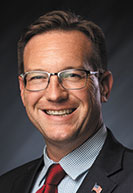Subscriber Benefit
As a subscriber you can listen to articles at work, in the car, or while you work out. Subscribe NowWith no clear end in sight, one foster parent stresses the impact that permanency could have on her two foster sons.
Indianapolis mother Ashley Hutchinson became a foster parent in 2017 and took custody of her boys shortly after.
Initially, the plan was reunification with their biological mother. The youngest was 2 at the time and the oldest was 5.
But the boys hadn’t been back with their mother for long when they were returned to Hutchinson’s care after a shooting incident in which the youngest was shot. They’ve been with Hutchinson ever since.
Hutchinson attempted to change the permanency plan to adoption, but that request was denied. Then, COVID-19 hit, and everything slowed to a crawl.
Hutchinson said nothing was moving with the case, but time was going by. That was when she realized she needed an attorney.
“Financially it was a lot. These attorneys are not cheap,” she told Indiana Lawyer.
She added that she is the only one involved in the boys’ case who had to hire counsel. Everyone else has an appointed attorney.
A mediation was scheduled recently in the termination of parental rights case, but then Hutchinson got a text saying it had been moved to May. Meanwhile, Hutchinson said, she continues to have to get permission for things like changing the boys’ hair or sending them to camp.
“They are tired of hearing, ‘I need to get permission for that,’” she said.
The oldest, who is now 10, has a better understanding of the situation than his younger brother, who has been in Hutchinson’s care since he was a baby. In fact, she said, when the younger boy goes to visit his biological mother, he thinks she’s only his older brother’s mother.
The younger boy has told Hutchinson that he just wants to be “regular” and not have to deal with caseworkers anymore. Her oldest has conveyed that he wants to be adopted, and he has a hard time explaining to other kids at school why he and Hutchinson have different last names.
“They want to be regular kids,” she said. “They don’t want to have to wait for approvals to go on vacation. They don’t want to have to ask.”
Hutchinson knows she’s not alone in situations like this. She talks with other foster parents who have gone through similar things and who feel like they’re in a “secret society.”

But according to Hutchinson, the foster parents are advocating for the children — not fighting against the biological parent’s connection.
“Right now, it looks very adversarial,” she said. “But that’s not the goal.”
She added that she wishes people weren’t villainized for acknowledging that in some situations, reunification is not always the best thing.
“When this case was reunification, I reunified and sent those kids home with everything; I had no problem,” she said. “I was petrified. I thought it was a horrifying idea. I thought that was insane. I sent everything and then they were back in less than two weeks later with the clothes on their back.”
HB 1310

Hutchinson is using her experience to advocate for House Bill 1310, a children in need of services bill authored by Rep. Ryan Lauer, a Columbus Republican.
Under HB 1310, if a child has been removed from the parent for at least 12 of the most recent 22 months at the time of a periodic case review, the permanency plan must include at least one intended permanent or long-term arrangement for care and custody of the child other than reunification. That’s a process known as “concurrent planning,” or pursuing two reunification plans at once.
Lauer introduced a similar measure last year that did not pass, so he revived it this year.
“I wanted to focus on changes to our system that will have the most impact and the most benefit for these vulnerable children,” he said.
“Family cases are always complex,” Lauer added. “But from my perspective, it’s hard for me to understand, as a legislator, how Ashley’s situation, how she does not have those kids adopted today.”
Hutchinson testified in favor of HB 1310 in committee, an experience she said left her feeling vindicated and really emotional.
But it’s not clear yet whether HB 1310, if passed, will impact her case — that will depend on where her case stands if and when the bill takes effect.
Still, “If it changes things for the people that come after me and are dealing with these cases that are going on for five, six, seven years, then it matters,” she said.
After passing the House 92-0, HB 1310 has been referred to the Family and Children Services Committee in the Senate. A hearing on that bill in committee had not been scheduled at IL deadline.

Rep. Carolyn Jackson, D-Hammond, worked with Lauer on last year’s bill. She said she’s much happier with this year’s version of the legislation.
“I think this kind of streamlines it and it leaves no question and no doubt as to exactly what you want and what should be done,” Jackson said.
After hearing Hutchinson’s testimony, Jackson amended HB 1310 to change when it goes into effect. Rather than going into effect in July like most other bills, if signed, the bill will go into effect immediately.
“Is two months, three months or whatever it is, a couple of weeks, is it going to make that much of a difference? You know what? I can’t say it will,” Jackson said. “But the reality is, I have seen situations where a month, a week, a couple of days ended up saving the child’s life.”
Concurrent concerns
Still, there are some reservations about HB 1310, even among child welfare advocates.
Andrea Marsh, an attorney at Child Advocates Inc., opined that concurrent planning isn’t a positive thing.

“I feel like it’s impossible to do concurrent planning,” Marsh said. “I feel like concurrent planning isn’t a thing, having two plans that are inconsistent with one another.”
Working toward reunification while also working on a permanency plan that goes in a different direction is “misguided,” Marsh said. Also, she said putting a timeline on the situation — like HB 1310’s 12-month timeline — doesn’t help, because the process takes time.
She said Hutchinson’s cases has gone on for so long due to facts that are fairly atypical. Her longest case took 10 years.
A better goal, Marsh said, would be to provide representation to children in those situations.
“I think the kid having a voice, direct representation for the kid can be very clarifying in some of those situations,” she said.•
Please enable JavaScript to view this content.
